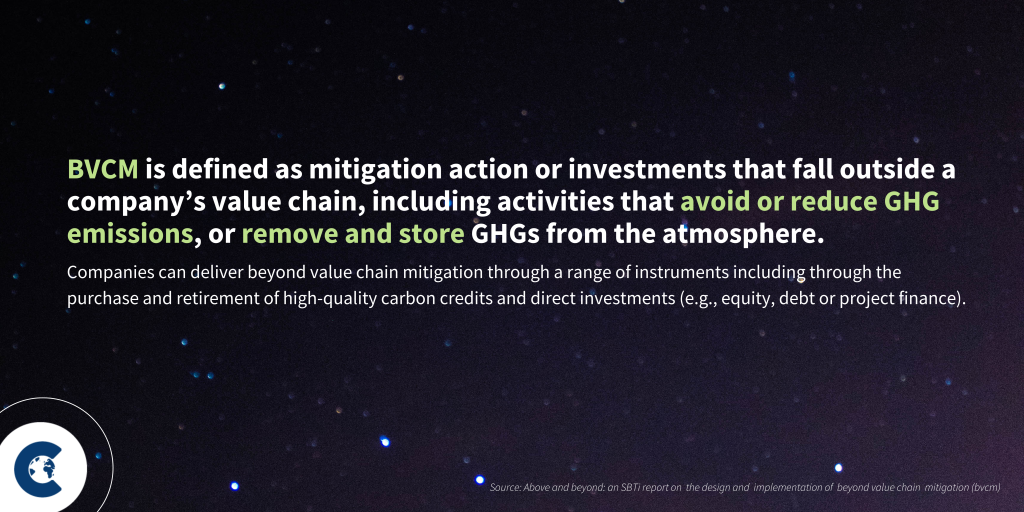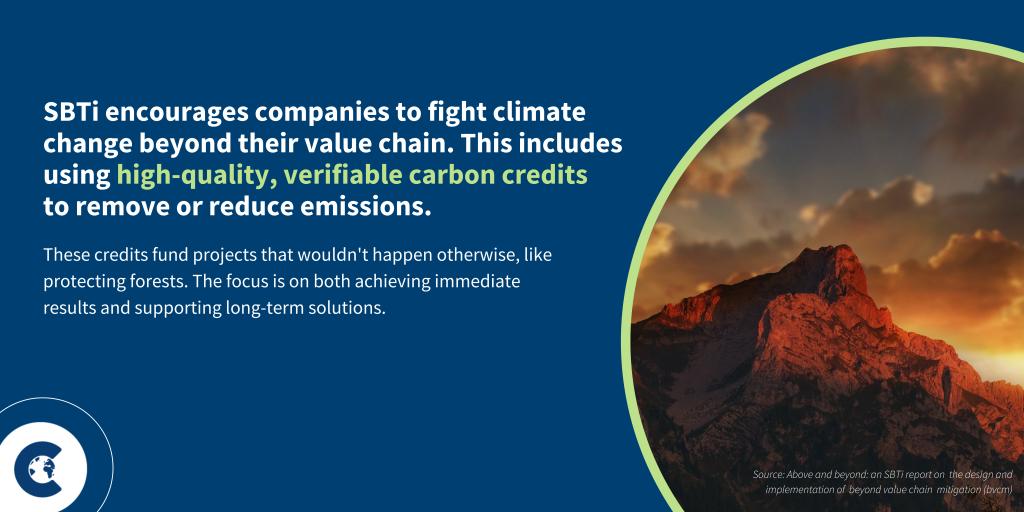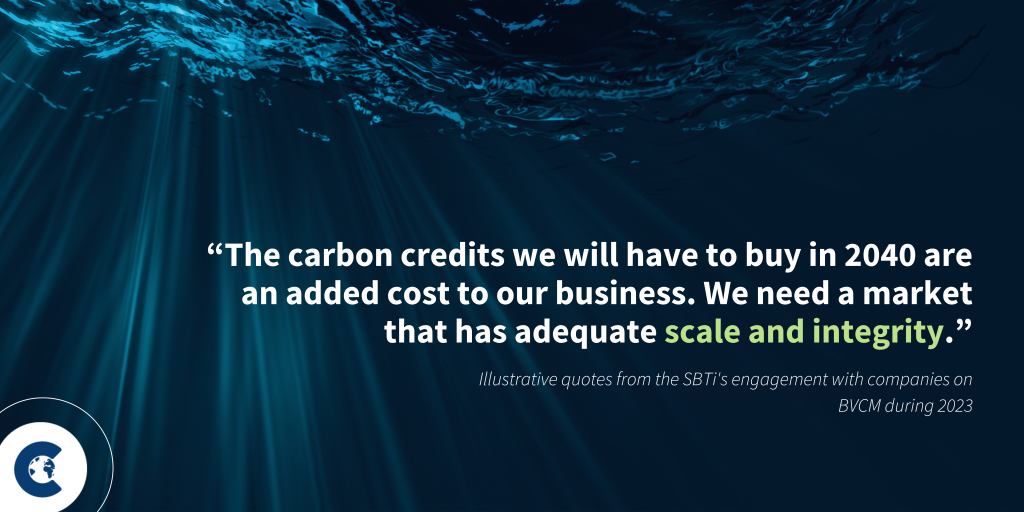The SBTi sees carbon credits as a valid tool within BVCM strategies for achieving near-term emissions reductions.
The SBTi has released two new reports to equip companies with the knowledge and tools needed to design and implement effective Beyond Value Chain Mitigation (BVCM) strategies. These reports aim to mobilize increased corporate action towards tackling climate change.
Above and Beyond: An SBTi report on the design and implementation of BVCM. This report provides a comprehensive guide for companies on crafting and executing BVCM strategies.
Raising the Bar: An SBTi report on accelerating corporate adoption of BVCM.
This report explores the broader ecosystem of climate action stakeholders, It examines the factors that incentivize or hinder corporate adoption of BVCM.
What is Beyond Value Chain Mitigation (BVCM) and why does it matter?
Businesses can now take their climate action to the next level and accelerate progress towards net-zero emissions with the Science Based Targets initiative’s (SBTi) Beyond Value Chain Mitigation (BVCM) strategies. BVCM goes beyond a company’s direct operations, allowing them to invest in emissions reductions or removals happening elsewhere. This could involve funding renewable energy projects, protecting forests, or developing new technologies that capture and store carbon. By participating in BVCM, companies can significantly amplify their environmental impact and become true leaders in the fight against climate change.

Setting science based targets to reduce emissions
Science-based targets show businesses how much and how quickly they need to reduce their greenhouse gas (GHG) emissions to prevent the worst effects of climate change. The Science Based Targets initiative is an organization that exists to support ambitious corporate climate action, ensuring that targets and approaches being carried out are verifiable and in line with the Paris Agreement goals. More than 4,000 businesses around the world are already working with the (SBTi). In their recent report, Raising the Bar: An SBTi report on accelerating corporate adoption of BVCM, the SBTI makes it clear that high-quality carbon credits are a definitive tool to help organizations reduce carbon emissions, beyond their own value chain and working alongside VCMI’s claim’s code of practice companies can confidently purchase high-quality carbon credits.
The SBTi stance, are carbon credits a net-zero shortcut?
In short. No. SBTi stands behind carbon offsetting so long as carbon credits purchased are high quality, verified and traceable. Here’s exactly what they say in their latest report:
BVCM is defined as mitigation action or investments that fall outside a company’s value chain, including activities that avoid or reduce GHG emissions, or remove and store GHGs from the atmosphere. It is included as a recommendation in the SBTi Corporate Net-Zero Standard. Companies can fund beyond value chain mitigation through a range of instruments such as the purchase and retirement of high-quality carbon credits and direct investments (e.g., equity, debt or project finance).
The SBTi highlights the importance of delivering near-term mitigation outcomes as well as providing funding for innovation and enabling activities to scale climate solutions and unlock future mitigation. Near-term mitigation outcomes can be funded through the purchase and retirement of carbon credits, while funding for innovation and enabling activities for future mitigation to occur would typically be provided via other instruments.

Supporting your 4-Step process: Where ClimateTrade can help
SBTi have outlined four high-level steps for designing and implementing high-integrity and
high-impact BVCM strategies. These are:
Step 1: set and work to deliver a net-zero target
Step 2: establish a BVCM pledge
Step 3: take action to deliver BVCM
Step 4: report BVCM activities and outcomes
Our team at ClimateTrade can actively support you throughout this process, particularly steps 3 and 4.
Regarding step 3, SBTI says:
Have BVCM mitigation outcomes verified by an independent third party that assesses the accuracy and completeness of an emissions reduction or removal intervention. Where carbon credits are the mechanism for deploying BVCM, credits should be verified by an independent third party to the protocols of a high-quality carbon standard.
At ClimateTrade we only work with the industry’s leading registries, who align themselves with associations such as Voluntary Carbon Market Integrity Initiative (VCMI) and their claims code of practice.

SBTi axes net zero commitments of 200+ companies
While many companies are committed to pursuing net-zero emissions through the Business Value Chain Model (BVCM) strategy, the path is proving difficult. Just last week, the Science Based Targets initiative (SBTi) removed the net-zero pledges of over 239 organizations because they failed to submit concrete targets for validation within a two-year window. These companies have publicly reaffirmed their commitment to net-zero, but they’re struggling to meet the specific requirements set by SBTi. This situation highlights the challenges companies face in translating their BVCM ambitions into achievable SBTi-validated targets.

Carbon offsetting and greenwashing concerns
A major hurdle for companies considering Beyond Value Chain Mitigation (BVCM) is the fear of being accused of “greenwashing.” Greenwashing describes companies that portray themselves as more environmentally conscious than they actually are. In the context of BVCM, companies worry that exceeding science-based emission reduction targets through BVCM initiatives might be misinterpreted. Stakeholders might see this as simply paying to offset their pollution elsewhere, rather than focusing on genuine reductions within their own operations. This concern is backed by data: a 2023 survey found that 35% of respondents (29 out of 83 companies) cited the fear of greenwashing as a key barrier to spending more on carbon credits, a core element of BVCM strategies. This fear extends beyond carbon credits, with 20% of companies not involved in other BVCM funding mechanisms citing greenwashing concerns as a key reason.
Ultimately, this fear of greenwashing is hindering not only the voluntary carbon market, but also global initiatives working tirelessly to improve and restore our planet’s health. With so much at stake, it’s crucial for companies to develop robust safeguarding solutions. These solutions should verify climate claims and ensure green financing is fully traceable and accountable. Only then can companies confidently embrace BVCM and contribute to a more sustainable future.
Partner with ClimateTrade to develop your offsetting strategy
Businesses hold immense power to redefine the future economy through climate action. Investing in sustainability within their operations and across their entire value chain (BVCM) is not just necessary, it’s a strategic opportunity. The Science Based Targets initiative’s (SBTi) guidance on BVCM aligns perfectly with this approach. By following their recommendations, companies can ensure both the volume and quality of investments needed to combat climate change. However, navigating the complexities of BVCM and offsetting strategies can be daunting. Partnering with ClimateTrade can help. We offer expertise and support to streamline your journey towards a sustainable future. Start now.








